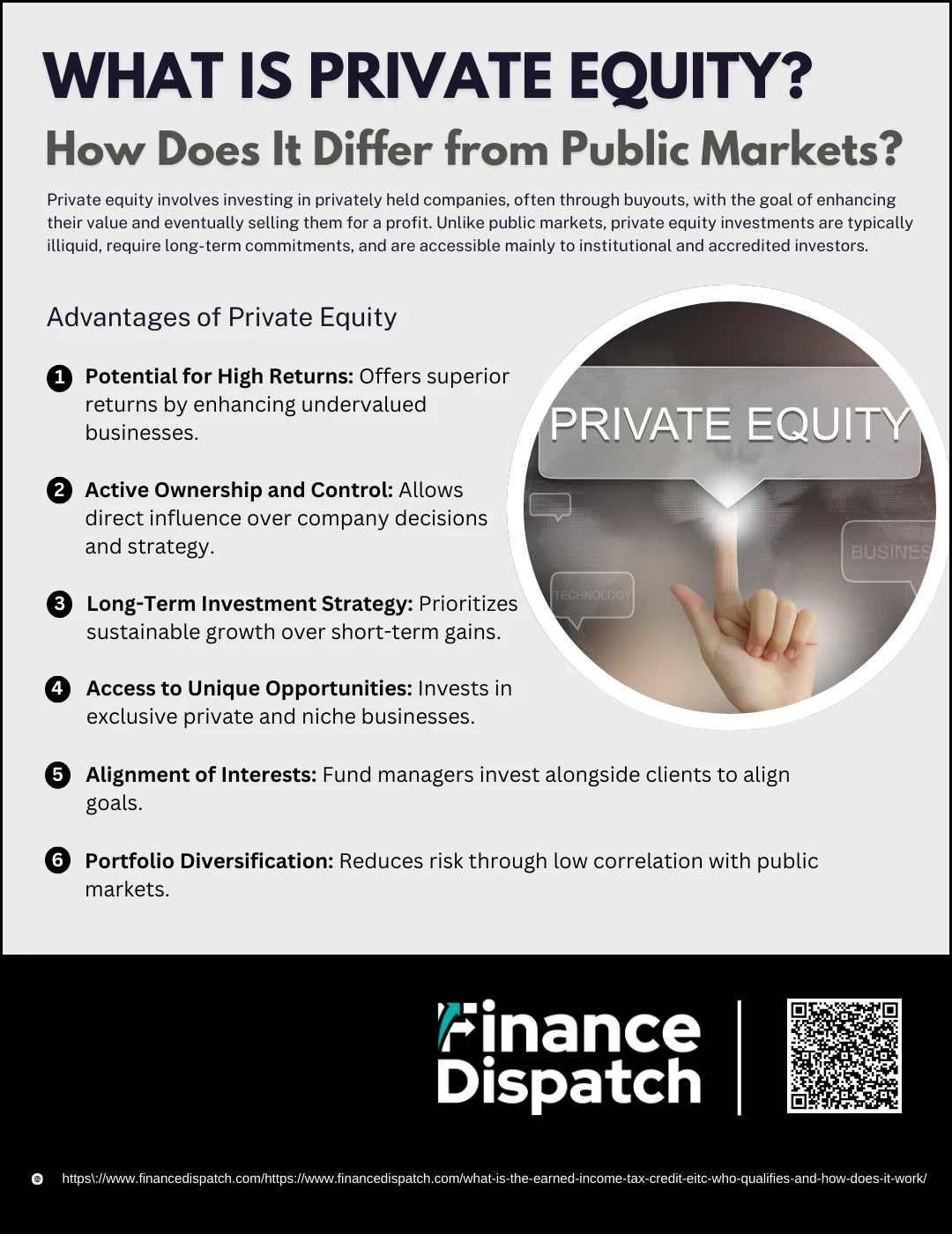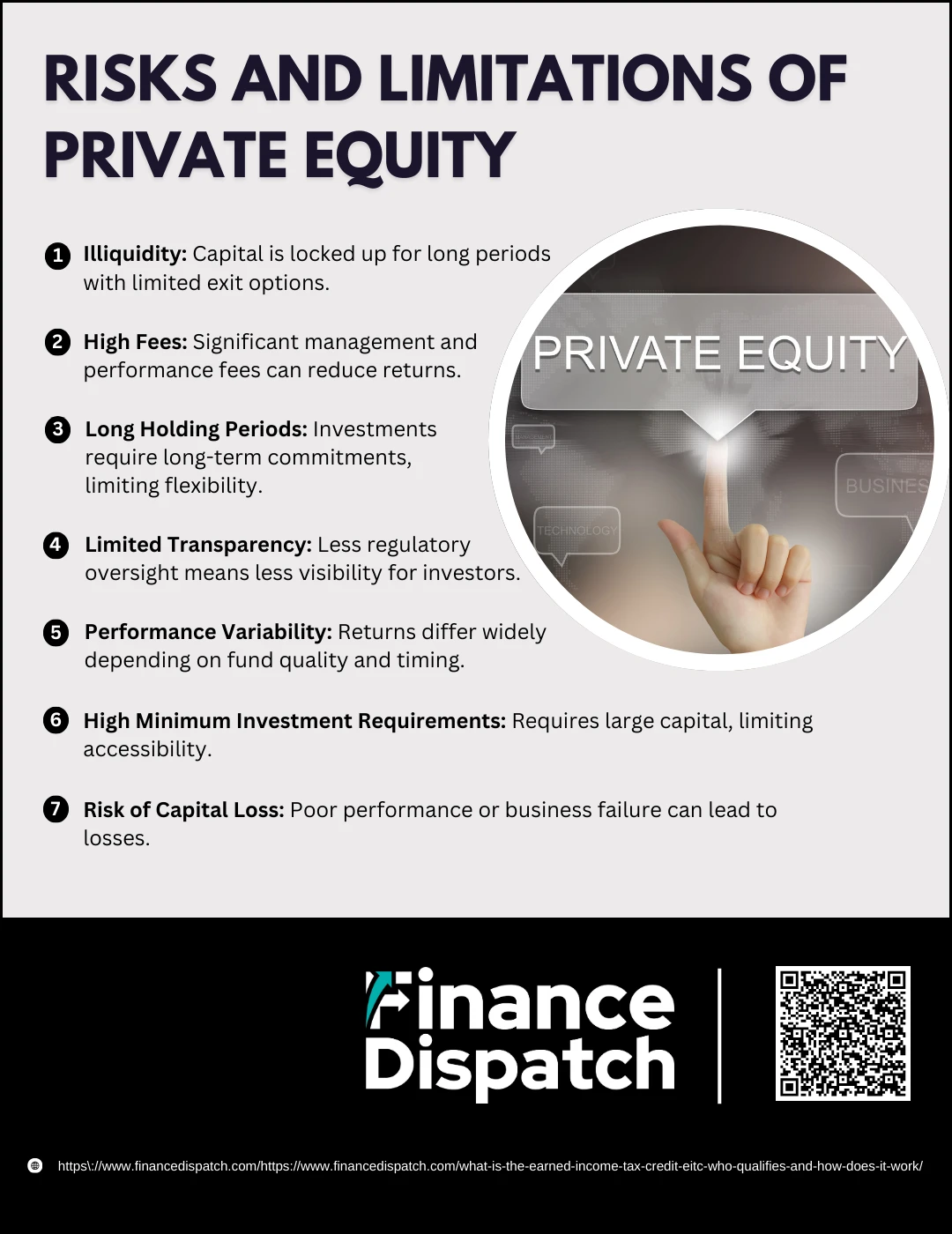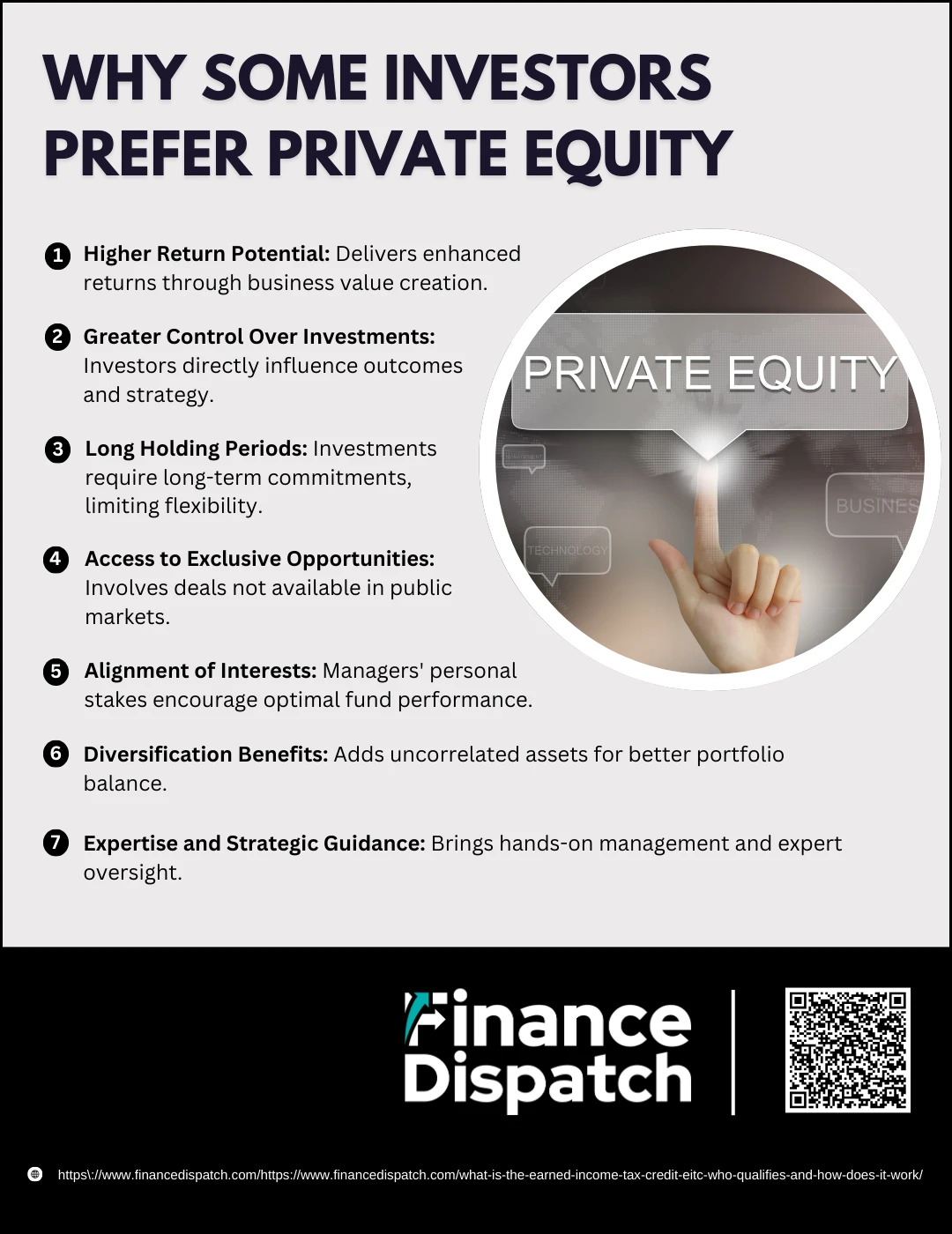Private equity is a form of investment that involves buying shares in private companies or taking public companies private, with the aim of improving their performance and eventually selling them for a profit. Unlike public markets, where shares are traded openly on stock exchanges and accessible to everyday investors, private equity operates behind closed doors, typically involving institutional investors and high-net-worth individuals. Understanding how private equity works and how it contrasts with public markets helps investors make informed decisions about where and how to allocate their capital. This article explores the core principles of private equity and highlights its key differences from public market investing.
What is Private Equity?
Private equity refers to investment capital that is not listed on public exchanges and is used to acquire ownership in private companies or take public companies private. These investments are typically made by private equity firms, which pool capital from institutional investors and accredited individuals to fund business acquisitions, expansions, or restructurings. The goal is to improve a company’s value over time through strategic management, operational improvements, or financial restructuring, and eventually exit the investment through a sale or public offering. Private equity is characterized by long-term investment horizons, active involvement in management, and a focus on substantial value creation.
What are Public Markets?
Public markets are financial markets where securities such as stocks, bonds, and other investment instruments are traded openly on stock exchanges like the New York Stock Exchange (NYSE) or NASDAQ. These markets are highly regulated to ensure transparency, protect investors, and maintain fair trading practices. In public markets, shares of companies are made available to the general public, allowing for broad investor participation and high liquidity. Prices are determined in real-time based on supply and demand, and information about the companies is publicly disclosed, enabling informed investment decisions. Public markets offer accessibility, diversification, and the ability to quickly buy or sell assets.
Key Differences between Private Equity and Public Markets
While both private equity and public markets serve as avenues for investment, they differ significantly in structure, access, and strategy. Private equity typically involves investing in companies that are not listed on public exchanges and requires long-term commitment and active management. In contrast, public markets offer liquidity, transparency, and accessibility to a broader range of investors. Below is a table highlighting the key differences between the two:
| Feature | Private Equity | Public Markets |
| Ownership | Concentrated among a few investors | Widely distributed among public shareholders |
| Liquidity | Illiquid; investments are locked in for years | Highly liquid; shares can be traded anytime |
| Regulation | Light regulatory oversight | Heavily regulated by government agencies |
| Valuation | Periodic, based on internal assessments | Real-time, based on market activity |
| Investor Access | Limited to institutional and accredited investors | Open to the general public |
| Time Horizon | Long-term (typically 5–10 years) | Short- to medium-term flexibility |
| Management Style | Active, with hands-on involvement in business operations | Passive or active, but generally less direct involvement |
| Transparency | Limited public disclosure | High level of public financial reporting and disclosure |
 Advantages of Private Equity
Advantages of Private Equity
Private equity has become an increasingly attractive asset class for institutional investors and wealthy individuals seeking higher returns, strategic control, and diversified exposure beyond public markets. Unlike public equities, where investor influence is limited and short-term performance pressures prevail, private equity allows for a deeper, more hands-on investment approach. It focuses on unlocking the intrinsic value of businesses through active management, operational improvements, and long-term vision. Below are the major advantages of private equity explained in more detail:
1. Potential for High Returns
Private equity investments are known for their ability to generate above-average returns, especially when fund managers successfully implement value-enhancing strategies. By targeting undervalued or underperforming companies and driving their growth, private equity can yield returns that often surpass those of traditional public investments.
2. Active Ownership and Control
Private equity investors typically acquire significant or majority stakes in companies, giving them the authority to make impactful changes. This level of control allows investors to restructure operations, replace management, reallocate capital, and execute strategic plans that can significantly improve performance.
3. Long-Term Investment Strategy
Unlike public markets, where quarterly earnings reports drive short-term decisions, private equity focuses on long-term value creation. Investors commit capital for extended periods, often 5 to 10 years, which enables thorough business development without the pressure of frequent performance reporting.
4. Access to Unique Opportunities
Private equity opens the door to investments in private companies that are not accessible through stock exchanges. This includes startups, family-owned businesses, distressed companies, or niche industries that can offer significant upside potential when transformed effectively.
5. Alignment of Interests
Fund managers usually invest their own money alongside that of their clients, creating a shared interest in the success of each investment. This alignment motivates fund managers to be more prudent and proactive in managing assets and achieving performance targets.
6. Portfolio Diversification
Including private equity in a portfolio adds diversification, as it is less correlated with public markets. This can reduce overall portfolio volatility and improve risk-adjusted returns, especially during times of market instability when private equity valuations are not subjected to daily fluctuations.
 Risks and Limitations of Private Equity
Risks and Limitations of Private Equity
While private equity can offer attractive returns and strategic control, it is not without its challenges. These investments are typically illiquid, complex, and suited for those with a high-risk tolerance and a long investment horizon. Investors must be willing to commit substantial capital for extended periods and accept limited access to information. Unlike public markets, private equity does not offer daily pricing or easy exit options, and the success of each investment heavily depends on the skills of fund managers and prevailing economic conditions. Below are the major risks and limitations explained in greater detail:
1. Illiquidity
One of the most significant drawbacks of private equity is its lack of liquidity. Once you invest, your capital is usually locked up for several years. There are limited opportunities to exit or redeem your investment before the fund reaches maturity, making it unsuitable for investors who may need access to their funds in the short term.
2. High Fees
Private equity funds typically charge substantial fees—commonly a 2% annual management fee and 20% of profits (carried interest). These fees can eat into returns, particularly if the fund underperforms. Unlike low-cost index funds, private equity’s fee structure is designed to reward fund managers significantly, even in average-performing scenarios.
3. Long Holding Periods
Investments in private equity often require a holding period of 5 to 10 years or more. This long-term commitment can be a disadvantage for investors looking for quicker returns or the flexibility to rebalance their portfolios in response to changing market conditions.
4. Limited Transparency
Private equity firms are not subject to the same stringent reporting and disclosure requirements as public companies. As a result, investors often receive limited information about portfolio companies, valuation methodologies, and fund performance, which can increase uncertainty and hinder informed decision-making.
5. Performance Variability
Private equity returns can vary dramatically between funds and over time. Fund performance depends heavily on the expertise of the fund managers, the timing of investments, industry trends, and macroeconomic factors. There is a wide gap between top-performing and poorly managed funds, which makes careful due diligence critical.
6. High Minimum Investment Requirements
Most private equity funds require significant capital commitments—often in the millions—making them accessible only to institutional investors and high-net-worth individuals. This high barrier to entry excludes most retail investors from participating directly in private equity opportunities.
7. Risk of Capital Loss
As with any investment, private equity involves the risk of losing part or all of the invested capital. If a portfolio company underperforms, fails, or faces economic disruptions, the financial consequences can be severe. Given the illiquid nature of these investments, recovery from losses may be difficult or impossible during the fund’s lifecycle.
 Why Some Investors Prefer Private Equity
Why Some Investors Prefer Private Equity
Private equity has carved out a prominent space in the portfolios of sophisticated investors due to its potential for higher returns, strategic involvement, and long-term value creation. While the asset class is complex and typically reserved for institutional players or wealthy individuals, it offers unique advantages that public markets cannot always provide. These investors are often willing to trade off liquidity and short-term flexibility in exchange for greater control, diversification, and the possibility of substantial gains. Below are the key reasons why private equity continues to attract strong interest among seasoned investors:
1. Higher Return Potential
Private equity investments aim to unlock hidden value in companies by improving operations, streamlining management, and pursuing growth strategies. By acquiring companies at favorable valuations and executing hands-on improvements, private equity firms often achieve returns that exceed those available in public equity markets. This return profile is particularly attractive in a low-interest-rate or volatile public market environment.
2. Greater Control Over Investments
Unlike public market investors who hold passive stakes, private equity investors frequently take majority or influential positions in companies. This ownership level allows them to shape business strategies, make executive decisions, and drive changes that directly impact company performance. Such control provides a sense of ownership and a proactive role in value creation.
3. Long-Term Value Creation
With investment timelines typically ranging from five to ten years, private equity supports a focus on sustainable growth rather than short-term profits. This long-term horizon allows for thoughtful business transformation, such as entering new markets, restructuring inefficient operations, or executing bold strategic moves that might be difficult under public scrutiny.
4. Access to Exclusive Opportunities
Private equity opens the door to a broad range of opportunities unavailable on public exchanges. These include early-stage start-ups, family-owned businesses, distressed assets, and companies in niche or emerging industries. By investing before these companies reach public markets—or helping them get there—investors can benefit from substantial value appreciation.
5. Alignment of Interests
Most private equity fund managers invest their own money alongside their clients, ensuring they have a personal stake in the success of each investment. This “skin in the game” approach promotes trust and ensures that fund managers are incentivized to act in the best interests of their investors.
6. Diversification Benefits
Since private equity returns often move independently of public markets, they can serve as a valuable diversification tool in an investment portfolio. This non-correlation can help mitigate overall risk and stabilize returns, particularly during periods of market downturns or economic uncertainty.
7. Expertise and Strategic Guidance
Private equity firms are staffed with experienced professionals who bring deep industry knowledge, financial acumen, and operational expertise to the table. Their involvement often improves company governance, enhances strategic planning, and accelerates growth—benefits that passive investors in public companies typically do not receive.
Conclusion
Private equity offers a distinct alternative to public market investing, characterized by long-term horizons, active ownership, and the potential for substantial returns. While it requires significant capital, patience, and a tolerance for risk, many investors are drawn to its unique advantages—such as greater control, access to exclusive opportunities, and portfolio diversification. At the same time, it’s essential to understand the trade-offs, including illiquidity, high fees, and limited transparency. By weighing these factors carefully, investors can determine whether private equity aligns with their financial goals and risk appetite, making it a powerful tool for those seeking deeper engagement and value creation in their investment strategy.



